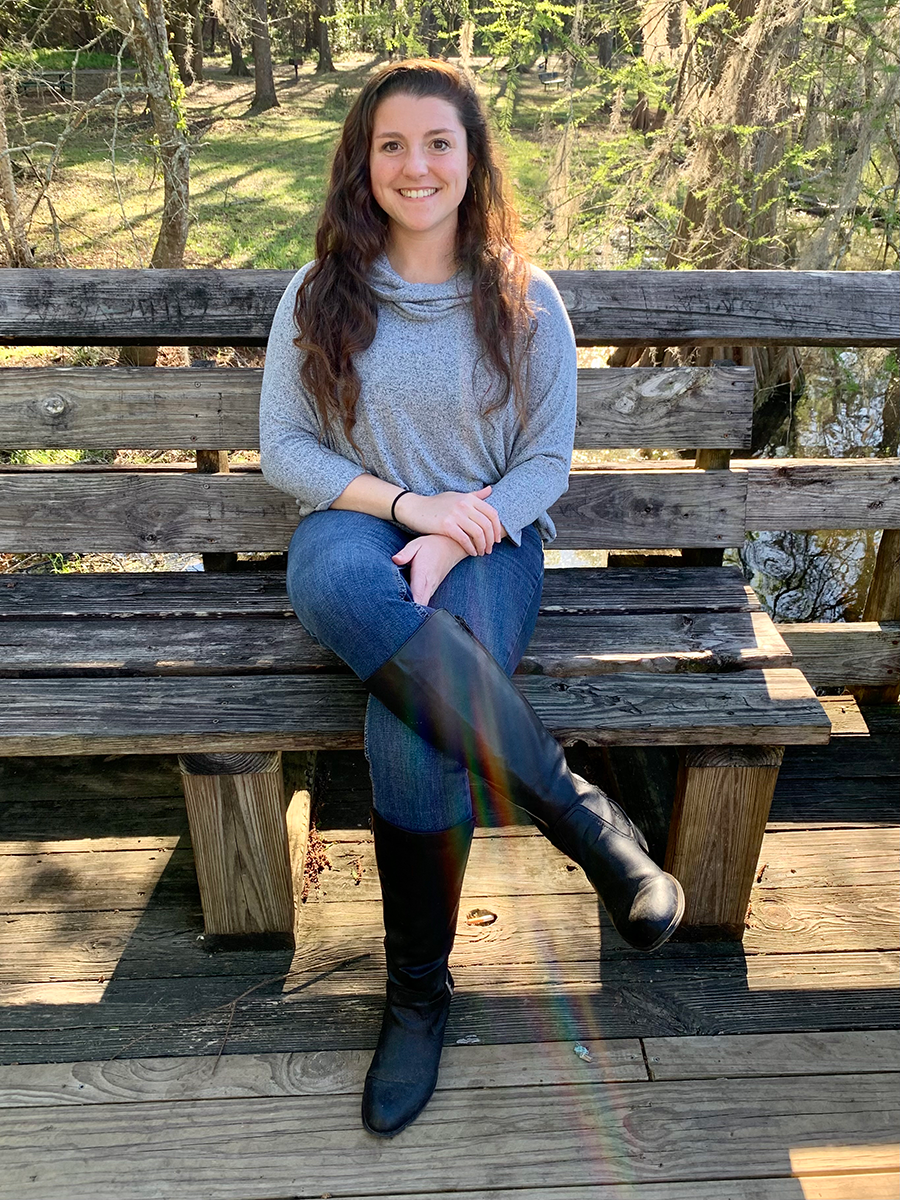Chemist with a Cause
Ph.D. candidate Brianna Coia uses chemistry to tackle environmental issues
When many people think of helping the environment, big-picture images of trash cleanup or climate change policy activism spring to mind. But for Florida State University Ph.D. candidate Brianna Coia, making a big difference is all in the details.

The Rome, New York, native began her undergraduate journey at Keuka College with plans of becoming a high school teacher specializing in a subject she found intriguing — chemistry. While working toward her degree, Coia began an internship in the quality control department at Ferro Corporation, a chemical manufacturer that develops polishes, pigments and coatings for a variety of everyday products.
“I was fascinated by the intricate science behind the materials they were making and appreciated how amiable and helpful my coworkers were,” Coia said. “Despite the internship only lasting a month, my experience there was incredible and changed my career path.”
A few months later, Coia landed another internship in the company’s research and development department and soon decided to apply to FSU’s Department of Chemistry and Biochemistry.
“I had an opportunity to tour campus, interact with graduate students and professors, and experience a little bit of Tallahassee,” Coia said. “I was inspired by the chemistry department’s dedication to supportive and collaborative research to combat complex issues in science. I knew instantly that I wanted to be part of this team.”
Associate professor of chemistry Justin Kennemur was just as intrigued by Coia’s work ethic when he learned the remarkable story behind her undergraduate degree.
“There was no official undergraduate chemistry major at Keuka College. When Coia discovered her passion for chemistry, she self-developed one!” Kennemur said. “I’ve never heard of a student liking chemistry so much that they developed their own major for it. That says a lot about Coia’s ambition.”
Pine Sap Plastic
Coia quickly assumed an instrumental role in research within the Kennemur Group, helping to develop an entirely new area of research focus surrounding computational techniques to aid in predicting experimental outcomes. This facilitated the group’s discovery of a new pine sap-based plastic that has the potential to be a gamechanger for developing sustainable materials.
A team of @floridastate researchers has discovered a new #plastic derived from pine sap that has the potential to be a game-changer for creating #sustainable materials. #FSU @FSUGS @ChemistryFsu @FSUartssciences @FSUResearch #ResearchInFocus
Read more ➡️ https://t.co/wI5e9Q5Ffb pic.twitter.com/jV6KORJR8l
— FSU Arts & Sciences (@FSUartssciences) July 27, 2021
The study analyzed alpha-pinene, the most abundant molecule produced from pine sap, which currently has limited uses due to how notoriously difficult it is to turn into plastic. Coia’s labmate, FSU doctoral student Mark Yarolimek, first synthetically modified the alpha-pinene to make the compound known as delta-pinene. The group then performed a range of “polymerizations” — chemical reactions to transform small liquid molecules into solid macromolecules, or molecules containing a very large number of atoms — to test how effective this molecule was at becoming a plastic.
Coia simultaneously analyzed the delta-pinene to understand if it possessed the proper thermodynamic properties to undergo polymerization. With resources from the FSU Research Computing Center, Coia performed density functional theory calculations, reaching computational results that paralleled the group’s experimental findings. The team then worked with FSU’s Office of Commercialization to file a patent for the material they discovered.
“This discovery marked the debut of Coia’s efforts to begin utilizing computations to help elucidate experimental behavior,” Kennemur said. “Many reactions we do involve molecular rings and the strain within those rings often plays a large part in their reactivity. Coia was able to show that the delta-pinene had sufficient strain to undergo polymerization to the material we discovered.”
Reduce, Reuse, Recycle
In her latest research, Coia is developing a computational approach to assess a monomer’s viability for chemical recycling. This spring, Coia was awarded the American Chemical Society Division of Polymer Chemistry Graduate Student Travel Award to present at the ACS Fall 2022 meeting in Chicago. As with her pine sap research, this new project underscores an important, overarching theme in her work — sustainability.
“This thrust of my research focuses on improving methods to screen new materials for their potential to be recycled,” Coia said. “The ability to identify not only if starting materials can be recycled, but also the ideal reaction conditions to achieve this feat, can substantially decrease the time, cost, effort, and waste produced in the pursuit of new and recyclable materials,” Coia said.
The first manuscript related to these investigations was published in May in the Journal of Polymer Science.
In April, Coia was also selected to receive the university’s Cheryl and Joel Rosenfield Endowment Award to support her research. As she closes in on graduation in 2023, Coia is looking forward to carving out a career that allows her to use chemistry to help make the world a better place.
“I’ve always been passionate about helping the environment, and I’ve enjoyed all the different disciplines of chemistry,” Coia said. “Polymer chemistry provided an opportunity to combine these interests using an interdisciplinary approach to address issues regarding the current plastic crisis.”
Tom Morgan contributed to this story.
